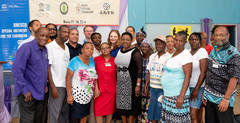Community-based Inventorying of Intangible Cultural Heritage in Kingston

The African Caribbean Institute of Jamaica/Jamaica Memory Bank (ACIJ/JMB), in collaboration with the Jamaica National Commission for UNESCO and the UNESCO Cluster Office for the Caribbean, coordinated a pilot, community-based, training workshop on the inventorying of intangible cultural heritage (ICH) in the urban context of Kingston on March 11, 2019 to March 19, 2019 at the Trench Town Multipurpose Centre, in Kingston.

Kingston, Jamaica was among the first group of pilot cities to be involved in this project, along with other communities in George Town (Malaysia) and Harare (Zimbabwe). This project is being implemented as part of a larger UNESCO project – Intangible Heritage and Creativity for Sustainable Cities.
During the opening, the Minister of Culture, Gender, Entertainment and Sport of Jamaica, Olivia Grange, said that “many Jamaicans associate intangible cultural heritage with the rural areas and of a past era when our elders would transmit to us knowledge about plants, Anansi stories, duppies and how to make the best run dung. This workshop, will, however, for the first time, examine what intangible cultural heritage exists within an urban space. The fact that Jamaica and Kingston in particular was selected for this pilot is a signal from UNESCO of the respect it has for the island’s culture and cultural elements”.
Director of the UNESCO Cluster Office for the Caribbean, Katherine Grigsby, emphasised that the objectives of this project component is twofold: on one hand to identify key issues related to living heritage and its safeguarding in urban contexts, including the potential contribution of intangible cultural heritage and its safeguarding to sustainable development of urban areas; and on the other hand develop a methodology for inventorying living heritage in urban contexts and update the existing/develop new materials for inventorying, based on the lessons learnt from the nine pilot projects.
The training workshop, facilitated by Richenel Ansano and David Brown, members of the UNESCO network of facilitators trained to deliver capacity building services, introduced 30 participants to theories and methodologies of community-based inventorying to strengthen their capacities to document and safeguard their traditional knowledge and practices. This is in keeping with the UNESCO Convention for the Safeguarding of ICH.
The capacity-building training workshop took a participatory and integrated approach by actively involving various members of the communities concerned. The workshop was divided into theoretical and practical sessions. The theoretical training introduced the requirements of inventorying from the viewpoint of the UNESCO Convention, such as research, developing questionnaires, conducting interviews, etc.
The practical sessions involved the participants in a two-day, field-based practicum which entailed carrying out inventorying work in small groups in two field locations – Trench Town (Reggae community) and Port Royal (fishing/boat-making community). This was followed by a meeting among the participants to share their experiences.
The target audience for this workshop included intangible cultural heritage bearers and practitioners, representatives of non-government organizations (NGOs) and institutions based in the selected areas of the city, as well as representatives of city governments. Participants trained during the workshop will undertake a pilot field exercise over a period of three months in their respective communities.
The implementation of pilot community-based inventories of the diverse living heritage of Kingston will contribute to the development of an appropriate inventory of methodologies and materials for the safeguarding and inventorying of the ICH in urban contexts.
This activity will also enable the country to strengthen its work in the national inventories of the ICH and formulate possible recommendations for policymakers and practitioners. Additionally, individuals and communities involved in the inventorying activities will be empowered and will recognize the important role that communities can play in inventorying their heritage in the city of Kingston.